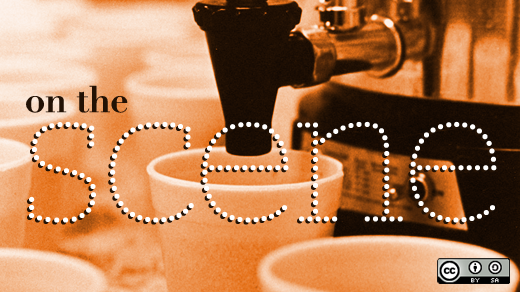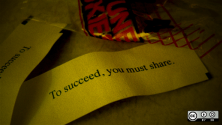Clifton Tunnell, a patent attorney registered to practice before the USPTO and associate of Anderson Dailey, LLP in Atlanta, GA and Andrew Norton of the United States Pirate Party and previously Pirate Party International, presented “Three Strikes and You’re Out” in the Electronic Frontiers Foundation (EFF) track at Dragon*Con 2010. They gave an overview of the graduated response program in the entertainment industry to pursue file sharers and online copyright infringement.
”Graduated response” means each time a copyright holder finds an infringement, they increase their response. The first time they find you infringing, you might get a warning. The next time they may
threaten to sue or pursue criminal penalties. The third strike is to cut off your connection.
Digital sharing
Distribution of digital content has only gotten easier over time. In the early years of web sharing, distribution happened over the client-server system. The more people using it, the slower the system was. But now with peer-to-peer (P2P) sharing, speeds and access actually increase with a greater number of users. Trammell demonstrated with the following list, a history of how, since P2P arrived, the two big players in the fight against sharing, the RIAA (Recording Industry of America) and MPAA (Motion Picutre Association of America), have fought it:
- 1999 – RIAA labels sued Napster
- 2002 – RIAA sued Aimster
- 2003 – MPAA studios sued Grokster
- 2006 – RIAA labels sued the developers of LimeWire
Trammell related the story of how the RIAA also filed a lawsuit against (among others), a man named Joel Tenenbaum. They got a judgment of 22,500 per song, resulting in a $675,000 judgment against a 21-year-old. The judge reduced this to $67,500. But a judgment doesn’t mean that they’re ever able to get that money.
So in 2008, the RIAA announced they’d stop suing individual users. It wasn’t worth the time or money. They still send out takedown notices. But instead of dealing with users, they’re dealing with the ISPs (Internet Service Providers). And the ISPs generally answer, particularly under a three strikes system, by disconnecting the user.
If you’re that disconnected user and live in an area with a single ISP, which is much of the US and much of the world, you’re cut off from the Internet. Today that’s huge—you’re not just losing cute cat videos. You’re losing access to things like job applications, banking information, and possibly your work.
Accusation without evidence
Within the Digital Millennium Copyright Act is Section 512(1), is the “Repeat Infringer Provision.” It offers safe harbor to ISPs by exempting them from liability for copyright infringement. But ISPs seeking safe harbor must adopt a policy that lets them throttle or terminate the accounts of repeat infringers.
Trammell quoted the EFF on the matter:
The DMCA has been used to invade the privacy of Internet users, harass Internet service providers, and chill online speech. The subpoena and takedown powers of Section 512 are not limited to cases of proved copyright infringement, and are exercised without a judge’s review.
The Anti-Counterfeiting Trade Agreement (which has its own session for discussion at Dragon*Con) is an international treaty to create standards for IP rights enforcement. It’s supposed to be a response to the increase in pirated works and is a framework for companies to voluntarily join outside of WTO, WIPO, and the UN. It’s also held in secret. Many in the US have sent FOIA requests seeking transparency. There have been leaks and a condensed version that have come out. And earlier this year, they confirmed that mandatory graduated response for signing companies is off the table.
But they’ve left in the provision that to be under safe harbor, an ISP has to adopt a policy to address unauthorized storage or transmission of materials protected by copyright. This almost mirrors the DMCA takedown provision and in fact used a mandatory three strikes rule as an example.
A big problem with all three strikes provision is the evidence requirement. Very little is required in the way of evidence, other than an allegation, which is one strike. The next allegation is another strike. Not proof—allegation. The allegation is usually based on a screenshot, log, or monitoring program without a chain of custody with no oversight. Presumption of innocence has become the presumption of guilt—the accused must prove their innocence. And it’s not a small number of accusations—eight hundred notices went out against Irish broadband users in June alone.
And earlier this year, Ireland became the first country to implement graduated response:
Ireland is the first country in the world where a system of "graduated response" is being put in place. Under the pilot scheme, Eircom customers who illegally share copyrighted music will get three warnings before having their broadband service cut off for a year.
The Irish Recorded Music Association (Irma), whose members include EMI, Sony, Universal, and Warner, reached an out-of-court settlement with Eircom in February 2009 under which the telecoms company agreed to introduce such a system for its 750,000 broadband users.
Norton said that these laws are often passed quietly (in France, for example, it was voted on over lunch). In the UK, it was debated for two hours and voted on the next day.
Norton also gave several examples of cases proving that it is easy to (either mistakenly or intentionally) wrongly accuse someone of infringement. A study in May 2008 by the University of Washington monitored BitTorrent streams and added fake peer info. They created IP addresses and sent them to trackers. They got 281 DMCA notices without sharing a single byte. Some of them were network printers or routers, computers that weren’t even turned on.
Tunnell recommended that those who are technologically knowledgeable help by offering to be an adviser to those who represent you.
“Most politicians have the worst name out there. But they really are hard working,” he said. “What is so difficult about being a politician is that you’re required to be an expert on every subject from farming to business to IP. You need to have a speech ready and have an opinion on everything. . . . They’re not technologically savvy and don’t understand the issue. But if you call them and offer, ‘If you ever want to talk about it, I’d be happy to talk to you,’ they’re thrilled.” These are very confusing laws, particularly for someone who’s never studied law, and this is only one thing on a representative’s plate.
Copyright was intended in Article 1, Section 8 of the US Constitution “to promote the progress of science and useful arts, by securing for limited times to authors and inventors the exclusive right to their respective writings and discoveries.”
Trammell noted that when the whole point is to promote progress of the arts, that should be the most important consideration in any copyright discussion: Are we, as a result of what we’re doing, promoting progress? The three strikes provisions don’t seem to be.







3 Comments